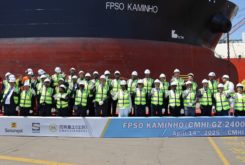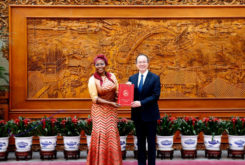The MPLA, the ruling party of Angola, has a new leadership structure. It includes a few unexpected choices of businessmen with links to key economic sectors – while other key political figures with important business links have lost status inside the party.
Economic diversification and particularly the development of agriculture are high on the priorities of President Joao Lourenço. So he appointed to the Political Bureau (PB) businessman Luís Fonseca Nunes, shareholder of local construction company Omatapalo; he comes from a traditional family linked to agriculture.
Replacing João Tyipinge, Luís Fonseca Nunes was also named Governor of Huíla, a province seen as key for Angola´s agricultural development.
Also named to the PB was Manuel “Nelito” Monteiro, a member of the Council of the Republic and an agricultural entrepreneur linked to the foundation of Banco Pungo Andongo, a business that he later sold.
According to our sources, both businessmen have in common the fact that their business history is not so much of concessions or deals with the State, unlike some of their predecessors. Also their membership of the party is relatively recent, compared to other members of the PB.
The changes were decided in the aftermath of the September 8th extraordinary congress. It saw former president José Eduardo dos Santos leave the MPLA leadership after nearly four decades. It also involved the promotion of a new generation of party leaders.
They include João Baptista Borges, Minister of Energy and Water: Yolanda dos Santos, wife of Secretary of State Sérgio Santos: MPLA Youth Member Daniel Félix Neto, former member of the party´s youth movement (JMPLA): and the new governor of Lunda Sul province, Maricel Marinho da Silva, the former deputy governor of Huambo. He was nominated for the PB – unlike the former governor, her uncle João Baptista Kussumua.
Some party heavyweights kept their places in the PB, such as Salomão Xirimbimbi, Pitra Neto, João Martins “Jú”, Fernando da Piedade Dias dos Santos “Nandó” and Carlos Feijó. But many left the party´s elite structure.
These included Paulo Kassoma, former party secretary general and a supporter of former president dos Santos: Higino Carneiro, former governor of Luanda – who sources say is being investigated by the Attorney General’s Office (PGR) for improper use of State funds – and also Manuel Vicente, former vice president and one of the country´s wealthiest man.
Manuel Vicente was influential in relation to the presidency in economic matters, in particular oil. His departure is interpreted as a result of a common agreement – he always was more interested in business than politics. In the context of the recovery of the party and the country´s image regarding corruption, the new president considered it desirable to keep Vicente distant from the party leadership.
President Lourenço has put fighting graft and corruption high on his agenda. He now has more favourable conditions to bring his agenda forward, with the party´s leadership structure mainly composed of loyalists, including Eugénio Laborinho, Manuel Augusto, Mário António, Norberto dos Santos “Kwata Kanawa” and Pedro Sebastião.
Party cohesion will be put to the test in the short term, due to the persistent economic and financial crisis. This has deep social repercussions, including unemployment, wage arrears and difficulties in access to health care and education.
Additionally, austerity measures are expected to be introduced through the financial assistance programme under negotiation with the International Monetary Fund (IMF). Its liberal policies include privatisations, a reduction in the number of civil servants and currency devaluation.
Lourenço also needs to present results, both at the internal and external level, of the anti-corruption drive. It has been promising and has contributed decisively to the improvement of Angola’s reputation abroad since the beginning of his mandate.
The new president sees the perception of corruption as capable of jeopardising implementation of a new economic model that is not based on oil. This will affect the country´s development.
Our sources say that this perception discourages private investment. The development of a productive economy based on agriculture, industry and mines — the one the president wants to implement — will only be possible through private external investment, as well as credits and other facilities difficult to guarantee with widespread corruption.
The president also considers that corruption encourages social inequalities and injustice that generate discontent. They are also contrary to human development and economic recovery.
In the negotiations underway for the granting of new financing from China, Chinese officials have shown special concern to ensure an improved management and application of money by the government of Angola.
The Chinese authorities intend to introduce more tight criteria in the new framework finance agreement. This was the main reason for the new financial framework negotiations not having been completed during the Forum for China-Africa Cooperation (FOCAC), on September 3 and 4 in Beijing, when Lourenço was present.



